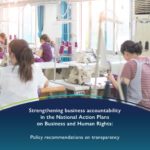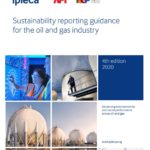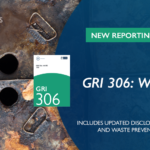New indicators which will help UK businesses to manage and report their impacts on the environment have been published today for consultation by Environment Minister Elliot Morley.
Defra has produced this new generation of guidelines which aim to help businesses address their most significant environmental impacts and report on these in a way that meets the needs of their shareholders and other stakeholders, said Elliot Morley.
The new indicators cover areas such as greenhouse gas emissions, waste, and water abstraction. 80% of UK business has 5 or less significant Key Performance Indicators against which the Guidelines recommend they should report their performance.
Elliot Morley stressed how businesses could no longer afford not to report on the environment:
"There is an increasing recognition that good environmental performance makes good business sense. The impact of environmental matters on business performance is increasing and will continue to do so.
"Interest in socially responsible investment is rocketing, a lot of people are investors in one form or another and more and more want to know where their money is going, the environmental practices it is sponsoring and how environmental risk and uncertainty is being managed."
"There is increasing pressure for business to consider these issues from elsewhere too as new rules explicitly requires quoted companies to look at the links between environmental and financial performance and not least because society increasingly demands that we take better care of our environment."
"Failure to minimise environmental impacts and plan for a future in which environmental factors are likely to be significant may risk the long-term value and future of a business."
The guidelines outline how environmental impacts can be measured through Key Performance Indicators (KPIs) – in many cases making use of standard business data that may already be collected – and how to report them.
Elliot Morley said: "The recent growth in environmental reporting has led to a number of different approaches and this has led to reports of varying quality, depth and rigour.
"These guidelines seek to set a standard which will give business some assurance that it has reported its environmental performance to an appropriate minimum level of accuracy and detail."
Malcolm Wicks, Minister of State for Energy at the DTI, said:
"I very much welcome this consultation on new guidelines which will offer practical help for companies looking to report on their environmental performance.
"Over the last couple of years we have seen a substantial increase in the level and quality of company reporting on social and environmental impacts, with UK companies among the leading examples of good practice.
"This is a trend we encourage and the OFR introduced by DTI earlier this year should also help stimulate increased transparency on a range of issues affecting company performance."
Simon Thomas, Chief Executive of Trucost, an environmental research company who helped Defra produce the guidelines, said: "The OFR requires Directors to report on KPIs that are significant to their company and the Guidelines will make it easier for businesses to report on significant environmental issues."
KPIs have been mapped out for over 50 business sectors, identifying the most significant direct and indirect environmental impacts of specific sector activity and industrial processes.
The consultation will end on 19 September 2005. The consultation paper and an online response form is available at: www.defra.gov.uk/corporate/consult/envrep-kpi/index.htm.
– UK Sustainable Development Strategy Securing the Future recognises that the Government, "has a key role to play in developing the business case for sustainable consumption and production – for example through standards, economic incentives, regulation, voluntary agreements, business support programmes, communications and consumer policy."
– The Government believes that the disclosure of environmental impacts, policies and performance benefits business, shareholders, wider stakeholders and society as a whole.
– From April 2005, the Government has introduced an enabling framework – the Operating and Financial Review (OFR) – so that quoted companies consider sustainable development issues alongside financial information. Wherever companies face environmental risks and uncertainties, or social, community and employee issues, we expect their OFRs to report on policies and performance to the extent necessary for shareholders to assess the companies strategies and their potential to succeed. So, for example, Directors will need to consider how their company is gearing up to operate in a carbon-constrained world, where UK carbon dioxide emissions will need to fall by at least 60 per cent over the next fifty years. In parallel, the Accounts Modernisation Directive will introduce requirements for large private companies to report on environmental or employee matters to the extent necessary for an understanding of a company’s development, performance or position.
– Trucost plc is an environmental research organisation that helps companies report on their environmental impacts in a way that is quantitative, comprehensive and that allows meaningful comparisons to be made between companies in differing sectors and geographies. Trucost’s methodology, which is developed with their international advisory panel of leading ecological economists, allows environmental impacts to be presented in financial terms so that they can be compared with existing financial reporting. Trucost helps companies to comply with the OFR reporting regulations by determining the environmental issues that are significant to their business. (www.trucost.com).
– The 25 Direct KPIs are:
Emissions to air:
· Greenhouse Gases,
· Acid Rain, Eutrophication & Smog Precursors
· Dust and Particles
· Ozone Depleting Substances
· Volatile Organic Compounds
· Metal emissions to air
Emissions to water:
· Nutrients and Organic Pollutants
· Acid emissions to water
· Metal emissions to water
Emissions to land:
· Pesticides and Fertilisers
· Metal emissions to land
· Acids and Organic Pollutants
· Waste (Landfill, Incinerated and Recycled)
· Nuclear Waste
Resource Use:
· Water Use and Abstraction
· Natural Gas
· Oil
· Metals
· Coal
· Minerals
· Aggregates
· Forestry
· Agriculture
Financial:
· Environmental Fines
. Environmental Expenditures
Media enquiries for Trucost plc contact: Philippa Thomson 020 7321 3731 philippa.thomson@trucost.com.



